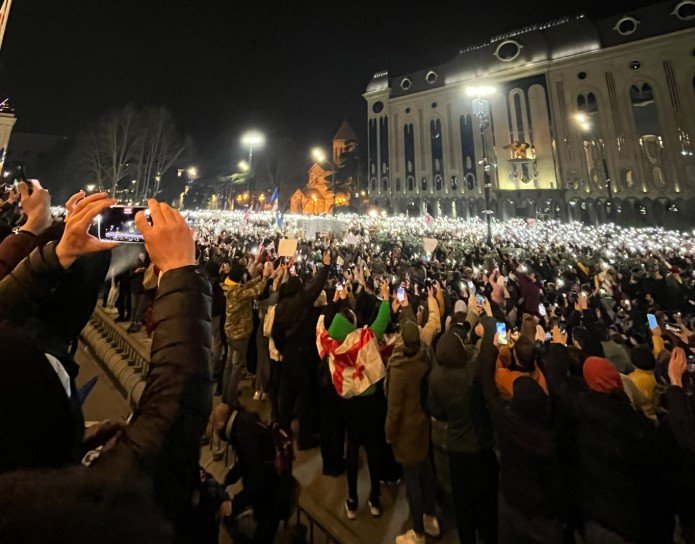Thousands of Georgians continue to flood the streets, defying new laws that threaten massive fines and surveillance. The government’s tightening grip sparks fear of a slide toward authoritarianism.
Streets of Tbilisi Turn Into a Battlefield of Ideals
Night after night, the streets of Tbilisi roar with chants, banners, and determination. Protesters, young and old, stand shoulder to shoulder — defiant against what they call an oppressive, pro-Russian agenda. It’s no longer just about EU membership; it’s about their future.
Nadim Khmaladze, a 60-year-old rights activist, never thought his evening protests could cost him nearly two years’ salary. “I knew the risks, but this… it’s punishment for having a voice,” he said, his voice heavy with exhaustion.
The Georgian parliament, led by the ruling Georgian Dream party, pushed through controversial penalties targeting demonstrators. First-time offenders now face fines equivalent to several months’ wages. Repeat protesters? They’re looking at financial ruin.
Some fear that’s exactly the point.

From Dialogue to Deterrence — A Sharp Turn
A year ago, the government touted dialogue with the EU. Now, talks are frozen, and Tbilisi’s streets have become a symbol of defiance. Authorities frame the protests as “foreign interference.” Opponents argue that’s just a convenient excuse.
What’s changed? One word: control.
- Fines: First-time protesters face penalties of up to 15,000 lari ($5,500).
- Repeat Offenders: Second offenses jump to 30,000 lari, with a potential three-month prison sentence.
- Surveillance: Reports hint at new tech deployments — drones, facial recognition, and phone monitoring.
The chilling effect is real. Parents warn their children. Some activists now protest in disguise.
A Divided Nation — But Where Does It End?
Public opinion splits. Many Georgians, especially the youth, view the EU as a ticket to a freer, prosperous future. For them, Moscow represents the past — a painful one.
The government, meanwhile, insists it’s preserving “national stability.”
“It’s not about Russia,” says Giorgi Kobakhidze, a government spokesperson. “We’re defending Georgia from external manipulation.”
Critics scoff. To them, this isn’t protection — it’s a crackdown.
Can the Movement Survive the Financial Strain?
For many, the fines alone could end their involvement. That’s the strategy, says political analyst Mariam Bezhashvili. “It’s not about jailing everyone — it’s about making protests too expensive to sustain.”
Some families pool money to cover fines. Crowdfunding efforts emerge online, despite cyberattacks on fundraising platforms. Others refuse to pay altogether, risking prison.
A protester named Lela, a university student, summed it up: “They can empty our pockets, but they can’t silence us.”
